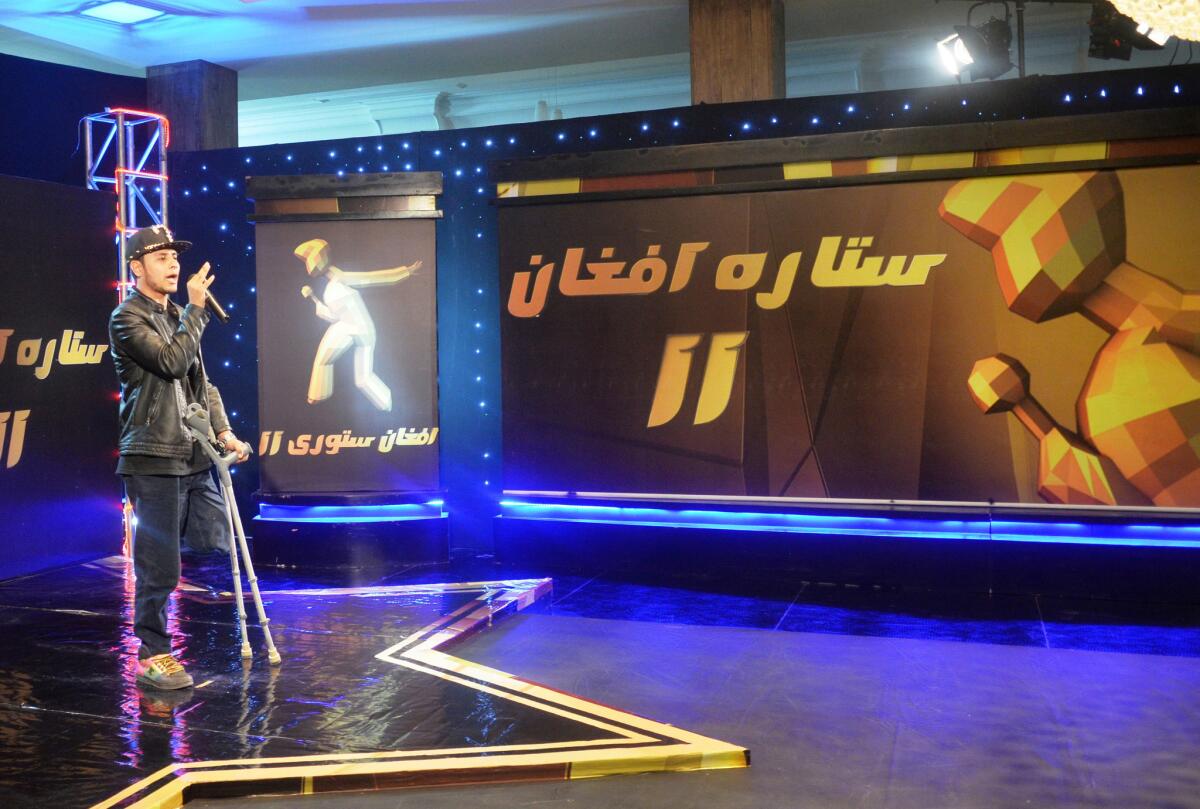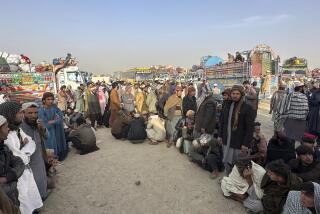Amid war and desperation, Afghans find relief in their version of ‘American Idol’

Contestant Farid Taqid, 19, tries out for “Afghan Star,” a singing competition TV show in Afghanistan.
For nearly 11 years, as Afghanistan suffered from war, political instability and economic volatility, there has been at least one constant source of entertainment: “Afghan Star.”
The “American Idol”-like TV singing competition draws millions of viewers across the country, even in remote areas, where families gather around an available television to root for contestants.
------------
FOR THE RECORD
Dec. 3, 7:20 p.m.: An earlier version of this post described Hafizullah Mohammadi as director of programming for Tolo TV. He is the head of Kaboora Productions, a company that produces original programming for Tolo TV. Farid Taki’s last name was incorrectly given as Taqid. Also, misplaced punctuation left the impression that the show recently had its first female contestant. She was the first female contestant from the city of Jalalabad.
------------
“American Idol” plans to go off the air in the United States after its current season, but “Afghan Star” seems only to be growing stronger, even in one of the most trying years for Afghanistan since the U.S.-led military invasion in 2001.
As producers began to plan for the 11th season this year, they tempered their expectations for the turnout. In recent months, an economic downturn and growing numbers of civilian casualties have prompted an exodus of Afghans, with thousands lining up outside passport offices and embassies looking for a way out of the country.
“We weren’t sure if anyone would even turn up” for auditions this fall, said Hafizullah Mohammadi, head of Kaboora Productions, a company that produces original programming for Tolo TV, which airs “Afghan Star.”
But Mohammadi said turnout at auditions in Kabul, the capital, and other cities exceeded expectations. Particularly heartening, he said, was an unprecedented number of aspiring female singers — and the selection of the show’s first female contestant from the eastern city of Jalalabad.
On a cold autumn day in the western city of Herat, about 400 contestants, including two young women, lined up outside the Esteqlal Hotel for their chance at stardom. By 9:30 a.m., the parking lot was teeming with contestants, including one hopeful who had traveled from Germany.
Waiting for the auditions to begin, they gathered in small circles and held impromptu jam sessions to the tunes of Ahmad Zahir and Farhad Darya, two long-standing Afghan musical icons, as well as pop singers from neighboring Iran and Tajikistan.
Some had tried out in years past. For others, it was their first attempt at television glory.
The judges — including three of Afghanistan’s biggest pop stars and a master of classical Afghan music — were pleased by the turnout and said it had elevated the bar for contestants.
“What we’re really looking for are unique talents, people who not only possess technical ability but also bring something new to the scene,” said judge Aryana Sayeed.
Farid Taki, a 19-year-old aspirant who had tried out last year, shocked judges when he entered the hotel on crutches, the right leg of his jeans sewn shut. In a rapid-fire, Dari-language rap — a rare genre on the program — Taki told of personal and political turmoil over the last year, including the cancer that claimed his leg.
The judges unanimously gave him a pass to the next round in Kabul. As he struggled to maintain his balance on stage, one of the judges, Obaid Juenda, offered to help.
“No, I can do it,” Taki replied. “I made it here onto this stage on my own.”
Dozens of contestants have gone on to successful careers, some performing for crowds of hundreds at weddings and private functions. Others have started their own recording and production studios where they nurture new talents. Last year, a spinoff program, “Superstar,” gave previous contestants another shot at fame.
The show has generated controversy in Afghanistan’s more conservative circles.
When a magnitude 7.5 earthquake struck last month, killing nearly 400 people in Afghanistan and neighboring Pakistan, several social media users blamed Sayeed, the judge, saying her dancing and singing in skin-tight clothes prompted the quake. Some critics have taken to calling the program “Satan’s Star.”
In a country still recovering from last year’s disputed presidential election — marred by allegations of widespread vote-tampering and ballot-stuffing — some also question the voting system on the program, in which viewers register their choices by telephone.
Some critics say the voting is manipulated by powerful businessmen and ethnic leaders who favor contestants of their own ethnicity. The producers brush off the accusations.
There are other barriers to a professional music career in Afghanistan. There are no record companies or royalty structures, making it difficult for singers to earn a living. Sayeed, who performs in Britain, said markets in Afghanistan sold many pirated albums of her songs, for which she receives no money.
The judges remain optimistic about the singing talent in Afghanistan, which is expanding into new genres. Sayeed said she is close to unveiling the Aryana Band, a trio of young male singers who appeared on a now-canceled Afghan version of “The Voice.”
She’s billing them as Afghanistan’s first boy band.
Latifi is a special correspondent.
More to Read
Start your day right
Sign up for Essential California for news, features and recommendations from the L.A. Times and beyond in your inbox six days a week.
You may occasionally receive promotional content from the Los Angeles Times.






